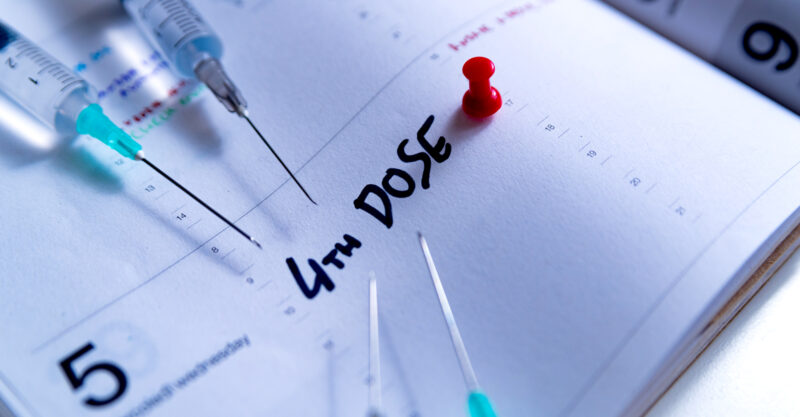4th COVID Shot Offers Little Protection Against Infection, Israeli Study Shows
Researchers at Sheba Medical Center conducted a small study that found the efficacy of a fourth dose of the Pfizer and Moderna COVID-19 mRNA vaccines resulted in only marginal protection from SARS-CoV-2 infection.
Miss a day, miss a lot. Subscribe to The Defender's Top News of the Day. It's free.
Researchers at Sheba Medical Center in Ramat Gan, Israel, conducted a small study that found the efficacy of a fourth dose of the Pfizer and Moderna COVID-19 mRNA vaccines resulted in only marginal protection from SARS-CoV-2 infection.
Their results, reported as a correspondence in the New England Journal of Medicine, stated:
“The interim results released show that the [fourth dose of the] vaccine offers little to no protection against contracting the virus when compared to young and healthy individuals vaccinated with three doses.”
According to the study, the fourth Pfizer dose showed 30% efficacy in preventing infection and Moderna’s fourth dose showed 11%.
The study’s authors noted, however, that the fourth dose provided “moderate protection against symptomatic infection” (Pfizer = 43%; Moderna = 31%). Symptomatic infection was defined as a fever lasting either more or less than 48 hours. Other systemic symptoms included fatigue, myalgia, and headache.
However, these efficacy numbers fall short of the required 50% threshold for Emergency Use Authorization (EAU) in the U.S.
No hospitalizations or deaths from COVID occurred in either the control or treatment groups. The majority of all COVID cases in participants were asymptomatic or had negligible symptoms.
However, 25.2% of fourth dose recipients experienced moderate-to-severe local reactions and 6.5% had moderate-to-severe systemic reactions to the second booster.
The investigators concluded that a second booster did not result in an immune response any greater than the first booster did:
“Along with previous data showing the superiority of a third dose to a second dose, our results suggest that maximal immunogenicity of mRNA vaccines is achieved after three doses …”
“Thus, a fourth vaccination of healthy, young health care workers may have only marginal benefits.”
Dr Julian Tang, clinical virologist, Respiratory Sciences, University of Leicester (UK), commented on the study:
“If Omicron continues circulating and we are still using the current first-generation COVID-19 vaccines against it, then I agree with the authors that the benefits to otherwise healthy, younger people will be marginal — and any 4th dose boosters will be more beneficial to the older and more vulnerable groups (e.g. those with comorbidities).”
Implications for the U.S.
As health officials raise questions about the usefulness and safety of additional booster shots, Moderna and Pfizer are making public appeals for additional shots.
Moderna on March 17 applied for EAU for a fourth dose for people 18 and older, and Pfizer on March 15 submitted its application for a fourth dose for people age 65 and older.
Pfizer CEO Albert Bourla during a March 13 appearance on “Face the Nation” said a fourth shot would be necessary, citing data that the vaccine maker submitted to the FDA but did not yet make publicly available.
Some doctors and scientists have noted the repeated administration of booster shots may have a “detrimental effect” on the immune system.
As reported by Dr. Joseph Mercola:
“Artificially inflated antibodies signal to your body that you’re always infected, and the resulting immune response could prove to be detrimental to your health.”
Keeping the immune system in a heightened state of alert can ”accelerate the development of auto-immune disorders,” according to Mercola.
The European Medicines Agency also raised concerns about repeated booster shots. As The Defender reported:
“According to the European Medicines Agency, continued booster doses every four months could pose a risk of overloading people’s immune systems and lead to fatigue.
“‘While use of additional boosters can be part of contingency plans, repeated vaccinations within short intervals would not represent a sustainable long-term strategy,’ the EMA’s head of vaccines strategy, Marco Cavaleri, said Tuesday during a press briefing.”

